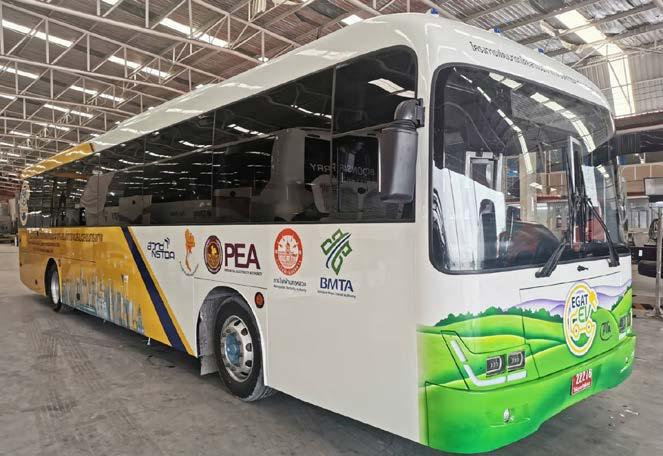
7 minute read
Interview: Electric Vehicles Program, National Science and Technology Development Agency (NSTDA)
Supporting innovation development for Thailand’s electric vehicle industry
Sorawit Wanitanukul, Director of Electric Vehicles Program, RDI Management for National Strategic, NSTDA
Advertisement
Thailand’s National Science and Technology Development Agency (NSTDA) is entrusted with the important task of accelerating science, technology and innovation development in order to respond to the needs of the industry and to enhance the country’s competitiveness in the global economy. The Agency has been working with partners from the academic, government, private and non-government sectors, both domestically and internationally.
In this interview, Mr. Sorawit Wanitanukul, Director of the Electric Vehicles Program, RDI Management for National Strategy, explains the program’s key collaboration with various organisations to support the research and development projects for Thailand’s electric vehicles (EVs) industry competitiveness improvement to become a part of global supply chain.
- How ready is Thailand to enter the EV industry?
We have been performing very well in terms of auto parts production for both domestic usage and exports. Last year, Thailand’s automotive industry was ranked eleventh in the world, fifth in Asia and first in South-East Asia. Most of Thailand’s vehicle exports are pickups and eco cars as well as extensive exports and imports of vehicle parts. Our automotive industry is already internationally recognised. Therefore, we have the capability to expand into the EV industry and our production standards are quite good. I believe Thailand is ready to become an EV parts manufacturer rather than a complete EV manufacturer because Thai auto entrepreneurs are already skilled on manufacturing conventional parts, while the EV infrastructure which includes standard, testing and regulation, and ecosystem of demand are quite ready as well. We must seek the opportunity to enter the supply chain for EVs high value parts, which are battery and motor parts either modules or sub-components. We must upgrade our parts to the global supply chain and adjust production technology to customise the processes that follow rapid technology changes.
- How difficult will it be for Thailand to adjust to produce EV parts? Is achieving its policy of 100% per cent zero emissions by 2035 possible?
The goal of 100 per cent zero emissions by 2035 faces challenges in every aspect of the industry, from manufacturing and operating to servicing vehicles. Within the next five years, the government and most of the private sector believe that EV will occur with the niche market group first, such as buses, small cars,three-wheel taxis (tuk-tuks), motorcycles and boats. Local manufacturers can now start producing battery packs for electric buses. As a result, they will gain knowledge of design ing the pack for electric buses and prototype development; they will initially be able to produce one or two prototypes. When Thailand fully promotes EVs in the mass passenger vehicle group or when car companies want to produce EVs, these parts producers or suppliers will have the knowledge and profiles that are ready to produce the high value EVs parts for the industry.
- How does the government co-operate and support the private sector in developing the automotive industry for the future?
The government’s policy and goals on EVs is becoming more concrete, such as providing support for operators who want to install charging stations. The government has also set a flat rate of 2.6 baht per unit for electricity charging throughout the country, which is cheaper than home electricity fees. The support also includes Board of Thailand (BoI) privileges aimed at promoting investment in the production of high-tech automotive parts such as battery parts, electric motors, power electronics devices, charging stations and even EV production.
At the same time, various agencies are trying to provide knowledge among the personnel concerned through various mechanisms in order to support the industry in the future, however, there is still the challenge of how to balance the availability of skilled labour with the rate of production. If the EV industry is definitely coming soon, we will need to speed up increasing human resources at the part development and production level, in a consistent and appropriate manner.
NSTDA’s policy is to comprehensively support EV technology and to increase the advanced knowledge among NSTDA personnel and researchers’ network on designing, developing, and testing EV parts, innovation and completed vehicles that could be potentials in EVs niche market. We support prototyping electric buses, motorcycle, boat and EVs conversion with partners, and also research on EVs demand and sustainable management.
- What obstacles exist that discourage Thai people from using EVs?
According to a Frost & Sullivan survey about few years ago, quite a few factors exist that discourage Asians from buying EVs such as safety, mileage per charge, the number of charging stations and vehicle price. Last year, the number of EVs registered at the
Department of Land Transport was less than 1 per cent of the total registered cars in Thailand. A better understanding of technology and the benefits of EVs needs to be created. For example, we have to make Thai people confident by certifying EV safety through reliable testing standards or we have to show how EVs can be a key to environmental solutions and benefits for fuel economy. No matter how slow or fast EV technology evolves, Thai consumers will have to accept the change.
- How did NSTDA and Mercedes-Benz begin co-operating in battery testing?
NSTDA has the Electrical and Electronic Products Testing Centre (PTEC), which is the testing center of all electrical products in accordance with Thai and international standards, and the National Metal and Materials Technology Center (MTEC), which is the research center of metal material and energy technology. The collaboration with Mercedes-Benz began about two years ago. By using the EVs battery pack technology through knowledge exchanges and the Mercedes-Benz manufacturing standards which are higher than normal standards, we can test batteries of almost every manufacturing company. Therefore, our objective is to be the test facility for the EV industry.
The partnership with Mercedes-Benz provides a good example if we want to open up the market to European Union or German car-makers. Before Thonburi Energy Storage Manufacturing (TESM) set its production line and sent employees to Germany for training, they collaborated training with NSTDA because we have researchers and experts in lithium-ion battery technology. Thus, we helped teach them the basics about batteries. We look forward to future collaboration on EVs battery pack prototype development and research on the battery pack design as well as the production technology.
- How many entrepreneurs are currently developing EV projects with NSTDA? What are the key performance indicators?
More than six manufacturers are co-operating with NSTDA on projects for EV buses, motorcycles, boats and EVs conversion. Manufactures of EVs parts such as battery pack, electric motor and drive, and other power electronic parts, were also our partners. Our key performance indicator is to support them build the EV manufacturing business with the supply chain and create value for the economy. The ultimate output must be a high-quality car which is also safe and sustainable.
- Can you provide some examples of successful EV research projects by NSTDA?
We began a collaborative project in September 2019 with other government agencies, such as the Bangkok Mass Transit Authority (BMTA), Metropolitan Electricity Authority (MEA), Provincial Electricity Authority (PEA), and Electricity Generating Authority of Thailand (EGAT), on the development of a Thai electric bus manufacturing industry. This joint venture, worth approximately Baht 50 million, will enhance Thai entrepreneurs’ capabilities of producing EVs. We have provided funding for four potential Thai entrepreneurs to convert BMTA’s old buses into EVs, together with support by experts from NSTDA and various educational institutions for engineering design and testing procedures. We are planning a comprehensive development and expanding process after converting four buses to EVs. It will proceed with safety standard testing, vehicle performance testing, registration applications and cover the possibility of charging stations. The project will end in September 2021.

Another project led by The Eastern Economic Corridor Office of Thailand (EECO) together with the Thailand Greenhouse Gas Management Organization (TGO) as well as NSTDA through the United Nations Industrial Development Organization (UNIDO), is now in the process of applying for funding from the Global Environment Facility (GEF). This project will focus on EVs demonstration for the environment solution in the Eastern Economic Corridor (EEC) in Rayong Province because the growth of industries and transportation will lead to a rise in environmental problems. Therefore, EVs such as modified Songthaew (two seating rows) vehicles or modern transport EVs will be developed and piloted in the EEC area. That will also encourage the installation of solar charging stations to reduce pollution caused by electricity production for EVs. This project will create a positive environmental impact, as well as domestic industries improvement to EVs production. If the project begins next year, as planned, it will be completed by 2026.
Interviewed by Chadaphan Maliphan and Napisa Jongkitcharoenkar, GTCC team










